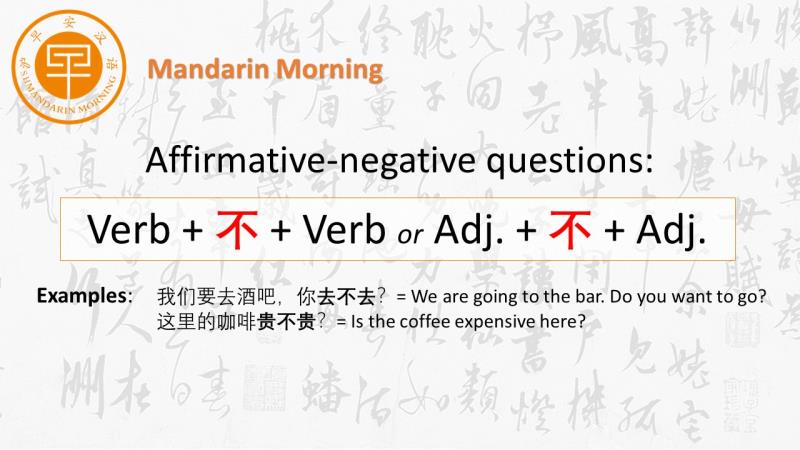A common way to form questions in Chinese is to first use a verb in the positive, then repeat the same verb in its negative form, similar to how in English we can say, "Do you have money or not?" or "Have you or have you not been to the park?" This sentence pattern feels a lot more natural in Chinese than those admittedly awkward English equivalents, however. Verb-Not-Verb: Structure: Verb + 不 + Verb Examples: 是不是 ? (shì bu shì) = Is it (or not)? 他们来不来?(tāmen lái bu lái) = Are they going to come or not? 你想不想我?(nǐ xiǎng bu xiǎng wǒ) = Do you or do you not miss me? 我们要去酒吧,你去不去?(wǒmen yào qù jiǔbā, nǐ qù bu qù) = We are going to the bar. Do you want to go? 我去买咖啡,你要不要?(wǒ qù mǎi kāfēi, nǐ yào bu yào) = I'm going to buy coffee. Do you want some? Note that the question provides the listener with both possible answers: it's either "Verb" or "不 (bù) Verb." Verb-Not-Verb with an Object: Structure: Subj. + Verb + 不 + Verb + Obj. Examples: 你回不回家?(nǐ huí bu huíjiā) = Are you coming back home or not? 她吃不吃鱼?(tā chī bu chī yú) = Does she eat fish? 你们要不要米饭?(nǐmen yào bu yào mǐfàn) = Do you want rice? 你爸爸喝不喝酒?(nǐ bàba hē bu hējiǔ) = Does your dad drink alcohol or not? 今天老板来不来办公室?(jīntiān lǎobǎn lái bu lái bàngōngshì) = Is the boss coming to the office today? Adjective-Not-Adjective: It can also be done with adjectives (adjectives often behave like verbs in Chinese): Structure: Adj. + 不 + Adj. Examples: 好不好?(hǎo bu hǎo) = Is it good? 热不热?(rè bu rè) = Is it hot? 他帅不帅?(tā shuài bu shuài) = Is he handsome? 这里的咖啡贵不贵?(zhèlǐ de kāfēi gùi bu gùi) = Is the coffee expensive here? Again, the question provides the listener with both possible answers: it's either "Adjective" or "不 (bù) Adjective." These are something like adding tag questions in English, in this case "Are you an adult or not?" If you wanted to translate it very literally, it would be, "Are you or are you not an adult?" In any case, the structure is a very common way to ask questions in Chinese. Two-Character Verbs and Adjectives: All of the verbs used so far have been single-character verbs. Using two-characters verbs in affirmative-negative questions is slightly trickier. You usually put 不 (bù) after just the first character, then put the entire verb. For example 喜不喜欢 (xǐ bu xǐhuan) is the usual question form of 喜欢 (xǐhuan). You can repeat the whole two-character verb twice, but it's more common (and more elegant) to insert 不 (bù) after the first character (and the same is generally true of two-character adjectives). Structure: [First Character of Verb] + 不 + Verb It can also be done with adjectives: [First Character of Adj.] + 不 + Adj. Examples: 喜不喜欢?(xǐ bu xǐhuan) = Do you like it? 高不高兴?(gāo bu gāoxìng) = Are you happy? 他女朋友漂不漂亮?(tā nǚpéngyou piào bu piàoliang) = Is his girlfriend pretty? 中国菜好不好吃?(zhōngguó cài hǎo bu hǎochī) = Is Chinese food good? 那个地方好不好玩?(nàge dìfang hǎo bu hǎowán) = Is that place fun? |